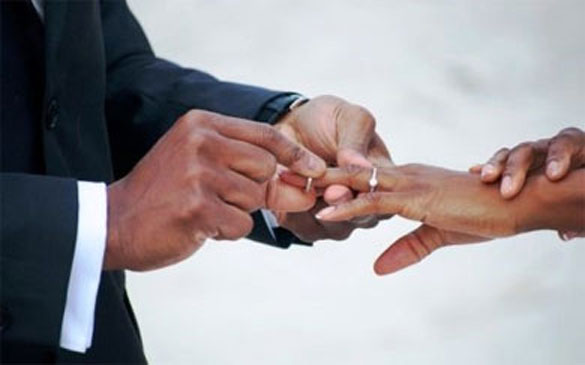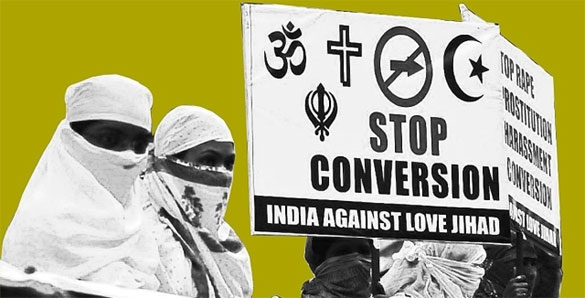By Rashid Samnakay, New Age Islam
5 December 2020
The imbalance in the Religious Argument that a Muslim male married to a non-Muslim female spouse living under the one roof and its environment can have a happy marriage but a Muslim female married to a non-Muslim male spouse cannot do so because she will endure an unhappy marriage. This defies rational thinking.

In this day and age, the argument by Muslim religionists that the wife is, as a natural necessity dependent on her husband for her 'existence', cannot be universally acceptable. Admittedly it is not yet the universal phenomenon that all females in the world are fully independent economically and in many other respects. As such there is a “long way to go” before gender equality is achieved.
------------------------------------------------------------------------------------
Also Read: Why Hindu Women (And Men) Should Oppose the ‘Love Jihad’ Law
------------------------------------------------------------------------------------
Not only many a scholars and analysts confirm this but it is an obvious fact for all to see and no doubt it has prompted humanity at large to address this inequality:
The Article 16 of the Universal Declaration of Human Rights of 10 December 1948 (General Assembly resolution 217 A) states:
Men and women of full age, without any limitation due to race, nationality or religion, have the right to marry and to found a family. They are entitled to equal rights as to marriage, during marriage and at its dissolution.
Marriage shall be entered into only with the free and full consent of the intending spouses.
The family is the natural and fundamental group unit of society and is entitled to protection by society and the State.
------------------------------------------------------------------------------------
------------------------------------------------------------------------------------
The religious establishments have accepted reluctantly perhaps, contrary to their traditions that now the female is free to earn her own wages, although sometimes for economic necessity, and for that can work outside the confines of Home in which she was obliged always to remain.
The changing cultural and societal norms have a momentum of their own and no amount of intervention has been able to stop that process. This freedom has inevitably a flow-on effect on other issues such as gender equality and interfaith marriage.
In the former interfaith marriage case given above, the female non-Muslim spouse is ( unintentionally!) given the credit that she has the maturity to mould herself to the religious norms of the Muslim husband and his family and can therefore cope with religious conflicts that may arise.

The corollary being that the Muslim male spouse lacks this ability so the female spouse makes up for the weakness. She may also opt to convert to husband's faith inorder to achieve the goal.
On the contrary in the later case, it seems that the Muslim wife cannot adapt to the religious differences of her non-Muslim spouse and therefore she must be protected within the ambit of commandments of Quran, the Book of her Faith, and so should not ever be married to a non-Muslim husband.
Thus implying that Quran somewhat preempts that a female Believer of Quran is immature and by nature intolerant because of her Faith, not be able to adapt herself in this situation! The wider inference is obvious that the followers of Quran are intolerant of others except on their own terms of Faith. This impediment in personal choice is addressed in UDHR Article:
Article 30: Nothing in this Declaration may be interpreted as implying for any State, group or person any right to engage in any activity or to perform any act aimed at the destruction of any of the rights and freedoms set forth herein.
It is interesting to note that among the eight countries that abstained from the UDHR, included the “Khadim ul Haramain”, the custodian of Islam, the Kingdom of Saudi Arabia; citing that the declaration goes against the Islamic Sharia. Implying that it goes against the Quran!
So, when a lay person has a cursory look at what Quran says on the issue, one is astounded at the differing meanings in translations and views expressed by eminent scholars. One has therefore to make one's own way as best as one can through the maze of male supremacy, keeping in mind the changing societal environment and human values over the past fifteen centuries of Human Rights in Quran. It is important to be aware of the 'equity' and 'equality' of masculine and feminine biological aspects in it.
Some verses are referred to below.
The verse 33-35 for example mentions men and women expressly in equal terms:
33-35, “Surely the men who submit and women who submit and the believing men and the believing women and...obeying ...truthful...patient...humble... charitable... restraining...chaste...men and women who remember God; God has prepared for them forgiveness and goodly reward.”
3-194 equality of men and women for God's reward.
24-2 & 3 the Adulterer men and adulterer women to be punished equally.
5-38 The thieving men and women.
9-67 The hypocrites men and women.
There are numerous other verses where men and women equality is addressed.
The definition of marriage in Quran:
4-21 Marriage is described as Firm Covenant... In other places this is elaborated as understanding, promise, commitment and therefore in its totality a contract.
It therefore stands to reason that a contract can only be entered into by parties which are fully mature, physically and intellectually, to share the burdens and responsibilities of an agreed commitment of the union of male and female. Verse 4-6, 6-153 and 17-34 refer. And as for any other worldly contracts, witnesses are required here too.
The chapter number 4 named Nisa (women) lays the foundation of marriage and needs to be looked at with open mind. Independence of the parties too is established therein. Although it becomes obvious that the language in Quran, as in translations, is heavily inclined towards addressing the male. This must be taken in the context of the times and environment that existed all those centuries ago. Even today for example it is common to refer to humanity as a whole by the term 'mankind', very much to the chagrin of the enlightened women; hence the modification now of addressing the 'chair person' and not as the chair man or woman etc!

From the above it becomes obvious that men and women of “mature age” only, can undertake the responsibilities of marriage, independently and conscientiously. There is generally an underlying caveat that the male gender on the whole is 'in-charge'(4-34) of the matters relating to Females , as she is somewhat immature at any age.
Interfaith marriage is therefore also addressed with that religious mindset. However verse 5-5 refers to this type of marriage among “people of the Book” and it seems that it is applicable in both male and female cases of marriage. If the definition of the people of the Book is accepted as pertaining to revealed Books then that covers all religions previous to Messenger Muhammad proclaiming Islam, with the Book Quran; and not just the Abrahamic ones.
Verse 2-221 which refers to “idol worshippers” as specific people, that is, having no concept of one God is prohibited to marry. But this must be taken in the context of war that they waged against the Muslim community during the Messenger's time. It could be argued that in this case – of existing enmity between the two parties, a Muslim woman marrying an enemy idol worshipper could land her and even her community at large, in difficult situation. A practical deduction and not an apologia.
The question therefore must be asked : Are these conditions existing in every conflict involving Muslims? Obviously not. And where there is a conflict between Muslims and 'Others', is it really that of Islam and idol worshipper, however much their commanders may portray it as one to enhance their cause?
To therefore infer that a Muslim female, particularly those few enlightened, educated and responsible persons should be prohibited from marrying a non-Muslim of equal standard to theirs is gross misrepresentation of Quran's commands of equality and equity. Muslim world must come out of its ancient time capsule and join the human race for its progress and enlightenment. To this end, please refer to:

No comments:
Post a Comment